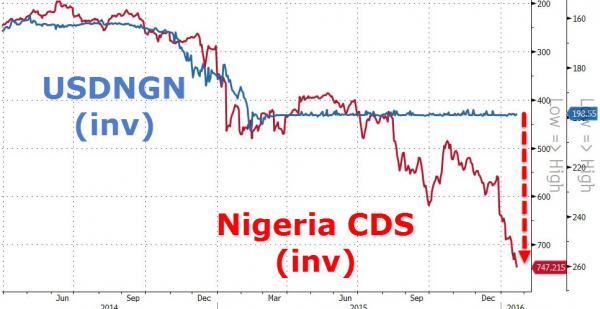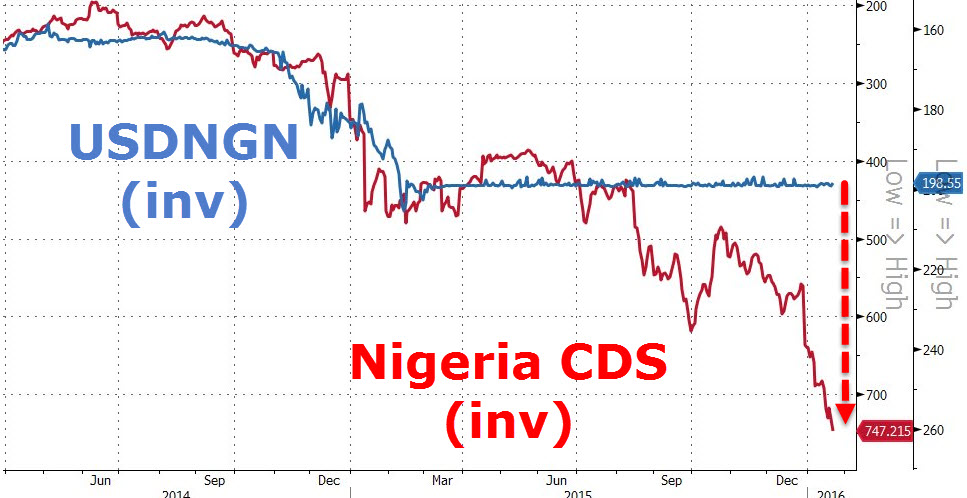Having urged "don't panic" just 4 short months ago, it appears Nigeria just did just that as the global dollar short squeeze forces the eight-month-old government of President Muhammadu Buhari to beg The World Bank and African Development Bank for .5bn in emergency loans to help fund a bn deficit in a budget heavy on public spending amid collapsing oil revenues. Just as we warned in December, the dollar shortage has arrived, perhaps now is time to panic after all. In September, Nigerian central bank Governor Godwin Emefiele ruled out a naira devaluation on Thursday and told people not to panic about a government order which risks draining billions of dollars from the financial system. In an interview with Reuters, Emefiele said he was ready to inject liquidity if needed into the interbank market, which dried up this week following the directive to government departments to move their funds from commercial banks into a "Treasury Single Account" (TSA) at the central bank. The policy is part of new President Muhammadu Buhari's drive to fight corruption, but analysts say it could suck up as much as 10 percent of banking sector deposits in Africa's biggest economy - playing havoc with banks' liquidity ratios.
Topics:
Tyler Durden considers the following as important: Bond, Borrowing Costs, Budget Deficit, CDS, Central Banks, Corruption, Crude, Gross Domestic Product, Hyperinflation, Monetary Policy, Renaissance, Reuters, Swiss National Bank, World Bank, zerohedge
This could be interesting, too:
Dirk Niepelt writes “Report by the Parliamentary Investigation Committee on the Conduct of the Authorities in the Context of the Emergency Takeover of Credit Suisse”
Marc Chandler writes US Dollar is Offered and China’s Politburo Promises more Monetary and Fiscal Support
Eamonn Sheridan writes CHF traders note – Two Swiss National Bank speakers due Thursday, November 21
Marc Chandler writes China’s Politburo Validates and Extends Pivot while the US Dollar Sees Yesterday’s Gains Pared
Having urged "don't panic" just 4 short months ago, it appears Nigeria just did just that as the global dollar short squeeze forces the eight-month-old government of President Muhammadu Buhari to beg The World Bank and African Development Bank for $3.5bn in emergency loans to help fund a $15bn deficit in a budget heavy on public spending amid collapsing oil revenues. Just as we warned in December, the dollar shortage has arrived, perhaps now is time to panic after all.
In September, Nigerian central bank Governor Godwin Emefiele ruled out a naira devaluation on Thursday and told people not to panic about a government order which risks draining billions of dollars from the financial system.
In an interview with Reuters, Emefiele said he was ready to inject liquidity if needed into the interbank market, which dried up this week following the directive to government departments to move their funds from commercial banks into a "Treasury Single Account" (TSA) at the central bank.
The policy is part of new President Muhammadu Buhari's drive to fight corruption, but analysts say it could suck up as much as 10 percent of banking sector deposits in Africa's biggest economy - playing havoc with banks' liquidity ratios.
With global oil prices tumbling, banks and companies are already struggling with the consequences of a dive in Nigeria's energy revenues that has hit the naira currency and triggered flows of capital out of the country.
Then JP Morgan kicked Nigeria out of its influential Emerging Markets Bond Index last week due to restrictions that the central bank imposed on the currency market to support the naira and preserve its foreign exchange reserves.
Since taking office in May, Buhari has vowed to rein in Nigeria's dependency on oil exports which account for 90 percent of foreign currency earnings. However, he has faced criticism from investors for failing to appoint a cabinet yet or outline concrete policies.
Amid confusion over the implementation of the single account policy, overnight interbank lending rates spiked to 200 percent, but Emefiele denied the policy had provoked a liquidity crisis.
"There is no shortage of liquidity," he said, pointing to an oversubscribed sale of treasury bills on Wednesday. "A spike is a momentary action. It's sentiment."
"I do not think there is any need for anybody to panic," he added.
But with CDS markets now implying a drastic devaluation (and capital controls already in place), it seems the time to panic has come...
We warned of the looming dollar shortage in March of last year, and most recently in December we warned that Africa was bearing the brunt as some of continent’s largest economies, including Nigeria, Angola, Ethiopia and Mozambique, restricted access to the greenback to protect dwindling reserves.
But, as The FT reports, it seems time is up for Nigeria, as the troubled nation has asked the World Bank and African Development Bank for $3.5bn in emergency loans to fill a growing gap in its budget in the latest sign of the economic damage being wrought on oil-rich nations by tumbling crude prices.
Nigeria’s economy is Africa’s largest and has been hit hard by the fall in crude prices — oil revenues are expected to fall from 70 per cent of income to just a third this year.
Finance minister Kemi Adeosun told the Financial Times recently that she was planning Nigeria’s first return to bond markets since 2013. But Nigeria’s likely borrowing costs have been rising alongside its budget deficit. A projected deficit of $11bn, or 2.2 per cent of gross domestic product, had already risen to $15bn, or 3 per cent, as a result of the recent turmoil in oil markets.
...
The country’s financial buffers are also eroding. The central bank’s foreign exchange reserves have nearly halved to $28.2bn from a peak of almost $50bn just a few years ago. A rainy-day fund that had $22bn in it at the time of the 2008-09 global financial crisis now has a balance of $2.3bn.
...
“I think we all agree that Nigeria is facing significant external and fiscal accounts challenges from the sharp fall in . . . oil prices, as of course are all oil exporters,” Gene Leon, the IMF’s representative in Nigeria, told the FT. But he added that Nigeria was not in immediate need of an IMF programme. “We are not in that space at all.”
...the new government is also facing questions about its handling of the economy. Capital controls introduced last year have weighed on growth and the IMF has called for Mr Buhari to pursue alternatives.
The central bank introduced the first controls before Mr Buhari took office last May, but many new measures have been imposed since and the president has repeatedly voiced his support for them.
During a January visit Christine Lagarde, the IMF’s managing director, urged the government to allow the naira to trade more freely so that it could help absorb economic shocks.
“It can also help avoid the need for costly foreign exchange restrictions, which we don’t really support," she said in an address to parliament.
But Mr Buhari and his government are likely to resist a full IMF rescue programme.
The former military ruler butted heads with the IMF while leading the government in the 1980s and many observers believe he would be reluctant to invite the fund in again.
The question is - will the $3.5bn loan be used to keep social unrest from exploding on the streets or to further attempt to sustain an unsustainable peg?
As we previously warned, defending one's currency is a losing game as not only Argentina most recently, but the Swiss National Bank most infamously, will admit.
"As African central banks place restrictions on access to their dollars, while burning through these reserves to support their currencies, they are also storing up longer-term troubles. “Few investors will want to put money into a country at an official exchange rate that is not set by the market and which is not seen as sustainable in the long run,“ said Charles Robertson, global chief economist at investment bank Renaissance Capital."
For now Africa has avoided the "hyperinflation monster", the result of an all too predictable scarcity of dollars, however the countdown is on and with every passing day that oil prices do not rebound, the inevitability of a full-on continental currency collapse, with hyperinflation and social unrest to follow, becomes increasingly more likely.
Worse, Africa is just the start: while the manifestations will differ, the mechanics of the dollar shortage, which we recently quantified in the trillions of dollars, are universal, and should the Fed's rate divergence path with the rest of the world continue pushing the USD ever higher, soon this USD-shortage will escape the confines of the world's poorest continent and make landfall somewhere where it will be far more difficult to ignore the adverse consequences of the global commodity collapse and the Fed's monetary policy.
Full story here

